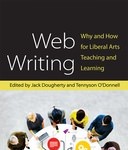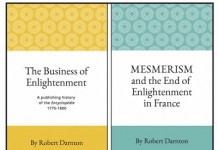 by Wahj (CC BY-NC-ND)Real worms don’t come in cans. The last time I saw worms offered for sale, they came in paper buckets, the kind that usually hold Chinese take-out. You open these up, and the worms don’t jump out at you. Maybe if you left the bucket open for a day or two, the worms would eventually find their way out, but any resulting problem is manageable. So when we say that doing something “opens up a can of worms”, the main thing to think about is not about the calamities that will emerge from the bucket, it’s whether or not you want to go fishing today.The “Non-Commercial” attribute of Creative Commons “NC” licenses is definitely a can of worms. “Non-commercial” is subject to varied interpretation, and the license is not entirely successful at removing ambiguities. What uses are commercial? For example, is a blog that attracts advertising revenue allowed to post a CC NC licensed ebook? Is a for-profit distributor of ebooks allowed to distribute an NC ebook? Is a non-profit charity allowed to print paper copies of an NC ebook and sell the copies? Is a for-profit copy shop allowed to charge a school to make copies of an NC textbook? Is a for-profit company allowed to use an NC ebook about widget manufacturing to improve its factory? Is it ok for me to show you this picture of worms? Et cetera.
by Wahj (CC BY-NC-ND)Real worms don’t come in cans. The last time I saw worms offered for sale, they came in paper buckets, the kind that usually hold Chinese take-out. You open these up, and the worms don’t jump out at you. Maybe if you left the bucket open for a day or two, the worms would eventually find their way out, but any resulting problem is manageable. So when we say that doing something “opens up a can of worms”, the main thing to think about is not about the calamities that will emerge from the bucket, it’s whether or not you want to go fishing today.The “Non-Commercial” attribute of Creative Commons “NC” licenses is definitely a can of worms. “Non-commercial” is subject to varied interpretation, and the license is not entirely successful at removing ambiguities. What uses are commercial? For example, is a blog that attracts advertising revenue allowed to post a CC NC licensed ebook? Is a for-profit distributor of ebooks allowed to distribute an NC ebook? Is a non-profit charity allowed to print paper copies of an NC ebook and sell the copies? Is a for-profit copy shop allowed to charge a school to make copies of an NC textbook? Is a for-profit company allowed to use an NC ebook about widget manufacturing to improve its factory? Is it ok for me to show you this picture of worms? Et cetera.
In building Unglue.it, we hope that readers and institutions will financially support Creative Commons relicensing of books that are important to them. In doing so, we need to make sure that the licenses we choose enable the things that the supporters want to do. We need to balance these uses against the rights and concerns of the authors and other rights holders who would be granting these licenses.
To get a better feel for what’s allowed and what isn’t under NC, we have to look at the “legal code” of the license. Here’s what it says in the Creative Commons Attribution-NonCommercial-NoDerivs 3.0 Unported (CC BY-NC-ND) License:
You may not exercise any of the rights granted to You […] in any manner that is primarily intended for or directed toward commercial advantage or private monetary compensation. The exchange of the Work for other copyrighted works by means of digital file-sharing or otherwise shall not be considered to be intended for or directed toward commercial advantage or private monetary compensation, provided there is no payment of any monetary compensation in connection with the exchange of copyrighted works.
 Let’s examine some of our wriggling worms against this “code”. Remember that I’m not a lawyer, and you should not rely on my scribblings for legal advice of any kind.
Let’s examine some of our wriggling worms against this “code”. Remember that I’m not a lawyer, and you should not rely on my scribblings for legal advice of any kind.
- Go ahead and improve your lucrative widget factory. The rights restricted by the NC clause are the rights to reproduce, distribute and publicly perform the work. The Creative Commons licenses do not restrict other uses of the work. If there are million-dollar ideas in the book, your ability to exploit them for commercial gain is not restricted by a CC license.
- If your blog is your business, it’s not a good idea to build it on NC licensed photos from flickr, even if you don’t charge for access. But if you’re a book blogger and you make money with advertising, is posting a free ebook “primarily directed towards commercial advantage”? This worm is jiggling a bit! If you’re a potential supporter of a book, this is the sort of use you probably want to support. It’s not really clear how to apply the NC clause. Similarly, Apple, Amazon and Google are big companies that make a lot of money in the course of distributing ebooks. Distribution of some ebooks for free gives them indirect commercial advantages. To the extent that the uncertainly in the NC provision prevents seamless distribution of the works to their users, it goes counter to what most book lovers would want.
- Even if you’re a non-profit, you can’t print and sell copies of an NC e-book to raise money for starving orphans with cancer.
The areas of uncertainty includes some use cases that we think are non-commercial uses. To make it clear that we consider the distribution of unglued ebooks for free to be an allowed activity under NC licenses, rights holders who offer works to the public through Unglue.it will agree to the following:
For purposes of interpreting the CC License, Rights Holder agrees that “non-commercial” use shall include, without limitation, distribution by a commercial entity without charge for access to the Work.
We may also require a statement to the same effect in the front matter of the released ebook; we’re still working out the file format details.
Given this clarification, why not go all the way, and require that Unglue.it rights holders agree to commercial distribution of works that get unglued?
It turns out that the alternative to our can of worms harbors some poisonous snakes. Let me introduce you to one of these. Look at the Amazon page for Dance Dance Revolution (Wii Video Game) a 140 page paperback supposedly edited by Lambert M. Surhone, Mariam T. Tennoe, and Susan F. Henssonow. The so-called publisher, “Betascript Publishing” takes Wikipedia articles and turns them into books. So far, so good. Perfectly legal within the scope of Wikipedia’s Creative Commons License (BY-SA). But how would you feel if you found a Wikipedia article that you wrote (with minor edits from others) on sale at Amazon for $57.47? When this happened to my brother he was mostly amused at the audacity of it all. But I think that if the same thing happend to a book I had worked on for a year of my life, it would seriously piss me off. If I had contributed money to “give the book to the world” I would be similarly aggravated. You could argue that Betascript is providing a valuable service by providing attractive formatting and improving the discovery of the article, but please don’t.
 by gabrielsaldana (CC BY-SA)Retention of commercial rights is potentially of significant value to authors, and can reduce their asking price for ungluing books. I’ve previously written about Cory Doctorow’s experience with selling “deluxe bound” versions of his Creative Commons Licensed books. There’s also the possibility that authors’ prior publishing contracts preclude them from offering commercial Creative Commons licenses (I’ll write more about that soon). Since most of the uses we imagine for unglued ebooks, including the uses most important to libraries, are not affected by our use of the NC-flavored licensed, we’ve decided to open this “can of worms” in hopes of catching more “fish”. We’ll allow rights holders to offer non-NC licenses, but we won’t expect them to do so.
by gabrielsaldana (CC BY-SA)Retention of commercial rights is potentially of significant value to authors, and can reduce their asking price for ungluing books. I’ve previously written about Cory Doctorow’s experience with selling “deluxe bound” versions of his Creative Commons Licensed books. There’s also the possibility that authors’ prior publishing contracts preclude them from offering commercial Creative Commons licenses (I’ll write more about that soon). Since most of the uses we imagine for unglued ebooks, including the uses most important to libraries, are not affected by our use of the NC-flavored licensed, we’ve decided to open this “can of worms” in hopes of catching more “fish”. We’ll allow rights holders to offer non-NC licenses, but we won’t expect them to do so.
Notes: I posted yesterday on the “Attribution” in Creative Commons Licenses. Here are some links on Betascript, which has over 350,000 “books” listed in some book directories:































